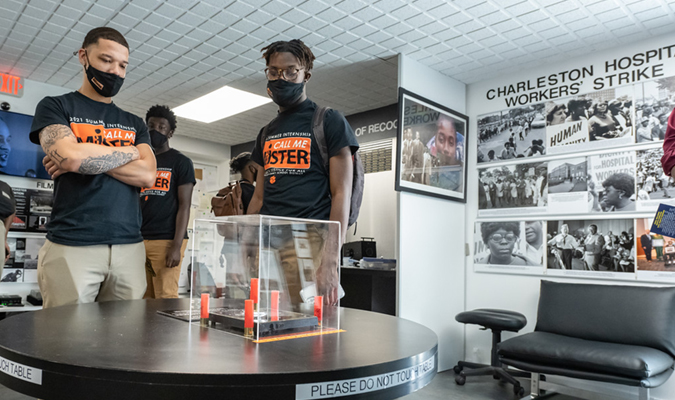About the Program
The Civic Engagement & Voting Rights Teacher Scholars program serves as an avenue for faculty to work together to create classroom teaching materials – by faculty, for faculty – to support a thriving American democracy. Funded through a three-year grant from the Andrew W. Mellon Foundation, the Teacher Scholars are recruited and supported from across the nation to work in cross-institutional, cross-disciplinary, humanities and arts-based faculty learning communities (FLCs). The Teacher Scholars design, create, and disseminate pedagogical materials for use in college courses nationwide.

Project Aims
- Establish FLCs to support the activities of the Teacher Scholars. Cohort 3 (2025-2026) will consist of up to 40 Teacher Scholars. Cohort 1 (2023-2024) involved 16 Teacher Scholars, while Cohort 2 (2024-2025) involved 24 Teacher Scholars.
- Implement an annual Summer Institute to launch the FLCs for Teacher Scholars and support their professional development.
- Support FLC regular convenings for Teacher Scholars over a year, with continued check-ins, discussion, and mentoring for a follow-up year.
- Support Teacher Scholars as they create and disseminate educational materials on civic and voting rights education.
- Evaluate the effectiveness of the Teacher Scholars program and deliverables.
Leaders
Dr. James Burns is Professor in History and specialist in African history and the social history of film and was awarded a Fulbright scholarship to Zimbabwe in 1995.
Dr. Bridget G. Trogden is Dean of Undergraduate Education and Professor in the School of Education at American University. She is an expert in undergraduate general education curriculum and pedagogical design.
The Civic Engagement & Voting Rights Teacher Scholars program is supported via collaborations throughout the civic, democratic, and voting rights networks, and especially by the Curriculum & Scholarship Subcommittee of the Faculty Network for Student Voting Rights.
Meet Cohort 1 Meet Cohort 2 Meet Cohort 3How to Apply: Expectations for Cohort 3
Each Teacher Scholar will attend an in-person 2 1/2-day Summer Institute in Clemson, South Carolina. The 2025 Summer Institute will be held May 27-29, starting in early afternoon on May 27 and concluding in early evening on May 29.
Each Teacher Scholar will virtually attend and participate in a year-long Faculty Learning Community (FLC) of 8 Teacher Scholars (including a facilitator), that will meet for 1-1 ½ hours approximately every 3 weeks from August 2025 through May 2026.
As part of the FLC, each Teacher Scholar will create open resource educational materials consisting of at minimum 6 deliverables for improving civic and voter rights education in courses in their own or allied disciplines: 3 active learning in-class activities, 2 assignments, and 1 course syllabus. These materials will be attributed with a Creative Commons attribution-noncommercial license (CC BY-NC) and archived in the Clemson University Libraries open access digital repository, TigerPrints. As part of the CC BY-NC, the Teacher Scholar retains the right to use and adapt the materials and to widely distribute them to others for noncommercial use.
Each Teacher Scholar will participate in survey research, assessments, and/or focus groups to help with program and process improvements. Appropriate human subjects research and informed consent protocols will be followed and shared with all Teacher Scholars prior to engagement in these activities.
-
- Eligibility
We welcome applications from faculty of any rank at a U.S. institution of higher education.
Faculty from minority-serving institutions (MSIs) and two-year colleges (technical, community, non-baccalaureate degree granting) are especially welcome to apply.
Eligible humanities and humanistic social sciences fields of study:
American Studies, Ancient Civilizations, Anthropology (excluding physical anthropology) or Archaeology, Architecture (historical or theoretical focus), Area Studies (humanistic focus), Art History, Classics, Communication (theoretical focus), Comparative Literature, Comparative Religion, Cultural Studies, English, Environmental Studies (study and application of humanities to the human environment, focusing on our diverse heritage, traditions, and history), Ethics, Ethnic Studies, Film/Cinema/Media Studies (theoretical focus), Fine Arts, Foreign Languages & Literatures (modern and classical), Gender & Sexuality Studies, Geography (excluding physical geography), History, History of Science/Science Studies, Interdisciplinary Studies (especially if one or more eligible fields is at the core), Linguistics, Literature, Medieval Studies, Musicology/Ethnomusicology/Music Theory, Performance Studies (theoretical studies), Philosophy & Political Theory, Political Science (theory, government, and/or qualitative), Religion & Theology, Rhetoric, Sociology (qualitative), Theatre (theoretical focus), Urban Studies.
Please note that this list may not comprise every eligible discipline. If you have questions regarding disciplinary eligibility, please contact project leaders Trogden and Burns to discuss – trogden@american.edu or burnsj@clemson.edu.
Faculty may be creating materials for undergraduate courses, graduate courses, or a mixture.
Faculty do not have to be experts in pedagogical design to apply. Professional development on inclusive teaching, universal design for learning, and learner-focused assignment design will be part of the Summer Institute.
- Support
Teacher Scholars will receive:
-
A stipend of $3,750 payable directly to the Teacher Scholar in the cohort year.
-
All costs of the Summer Institute will be covered by the program, including food, lodging, travel and transport.
-
- Additional Opportunities
Teacher Scholars will have the opportunity to participate in dissemination activites (possible conference presentations or additional publications) for the educational materials created.
- What Does It Mean to Create Educational Materials?
Through engaging in the Teacher Scholars program, participants will have opportunities to innovate. The collection of materials created thus far is available here for perusal.
There are multiple and divergent ways that Teacher Scholars can develop educational materials related to the topic. Some examples of content and learning outcomes could include:
-
Opportunities for students to understand how civic engagement affects aspects of their personal and professional lives
-
In-class discussions and debate prompts
-
History of voting in the U.S.
-
Voting conditions (suppression, gerrymandering, impacts of new laws, long lines, etc.)
-
Local, primary source materials related to issues such as red lining or educational legislation
-
Roles and impacts of grassroots activism
-
Segregationist systems and how they impact public structures
-
Rhetoric involved in ballot measures
-
- Application
The application is available via weblink -
https://american.co1.qualtrics.com/jfe/form/SV_aacLRi9LbkNWdds
Click here to submit your application, on or before February 21, 2025.
- Eligibility
